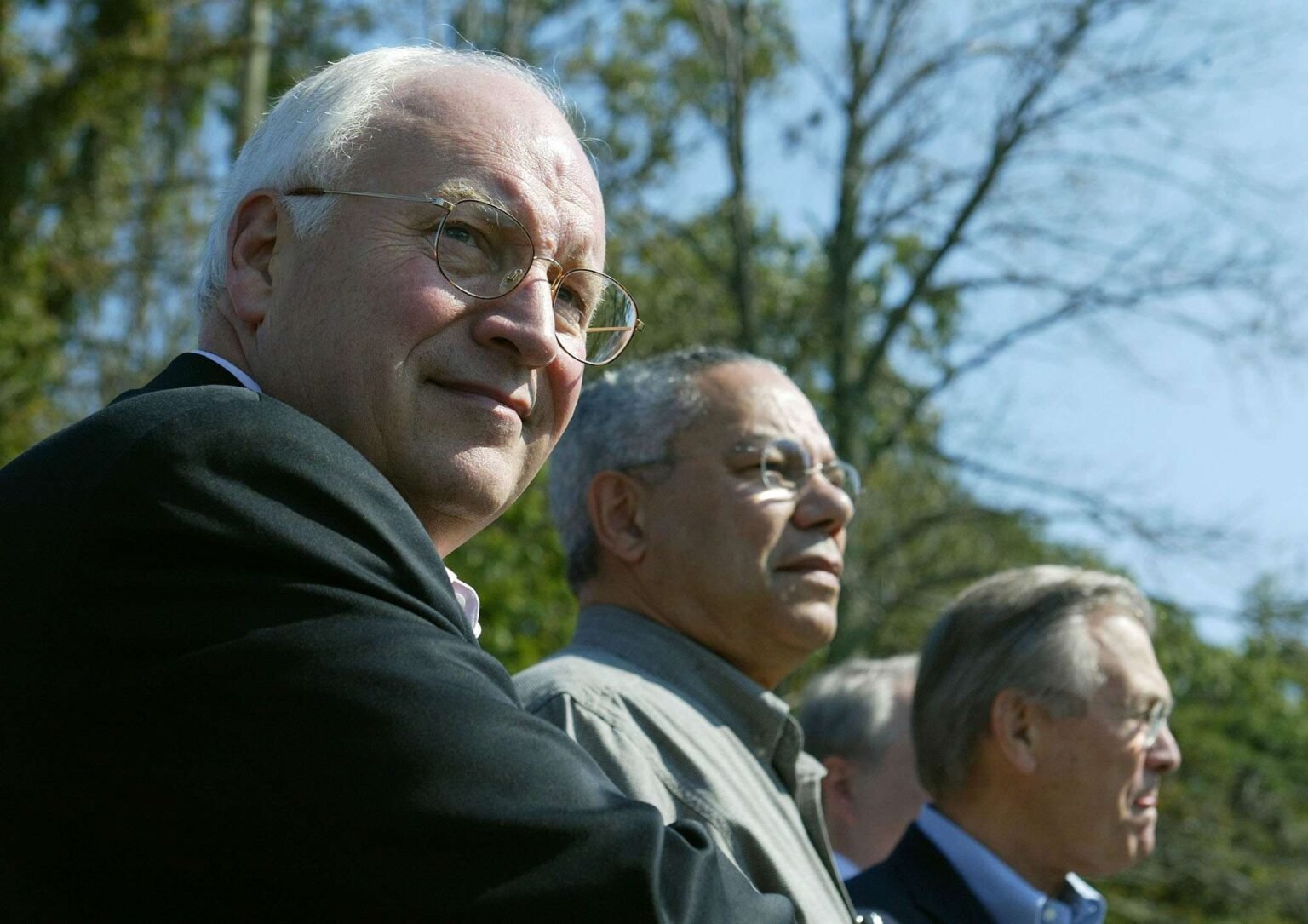Listen to the article
Dick Cheney died of old age in his own bed, surrounded by a loving family. In life, he had made sure that hundreds of thousands of people would not enjoy the same privilege. The former vice president had a deep commitment to presidential power, which he had the chance to implement during the so-called “Global War on Terror.” The fruits of his efforts were a disastrous war of choice against Iraq, a torture program that dishonored America, and a surveillance state that we still live under.
One of Cheney’s more famous nicknames was “Darth Vader,” a reference to the villain of Star Wars. Both he and George W. Bush, the president Cheney served under, leaned into the epithet for laughs. After all, Cheney once shot his hunting partner in the chest, only to have the victim apologize.
But Cheney’s ruthlessness was not just a matter of eccentric personal behavior. In September 2001, he infamously told NBC News that the U.S. government would have to cross over to the “dark side” to keep Americans safe. Asked years later about the fact that 25 percent of CIA detainees were innocent, including a man who was tortured to death, Cheney said that he has “no problem as long as we achieve our objective.”
Before becoming the face of the war on terror, Cheney was a cold warrior. As a Ford administration staffer, he pushed back hard against attempts to expand the Freedom of Information Act in the wake of the Watergate scandal. After a ten-year stint in Congress, he was appointed Secretary of Defense by President George H.W. Bush. In that position, Cheney oversaw America’s first post-Cold War displays of muscle, the wars against rogue former client dictators in Panama and Iraq.
“By God, we’ve kicked the Vietnam syndrome once and for all,” the elder Bush exclaimed in a 1991 speech, standing in front of Cheney, who no doubt felt the same. Cheney had entered government at a time when civil libertarians and foreign policy doves, galvanized by the Vietnam War and the Watergate scandal, were hemming in presidential power. Now he had a taste of what the White House could do without limits. Cheney even commissioned a study on using nuclear weapons on Iraq, a route the elder Bush thankfully did not take.
Along with a belief in unilateral action, Cheney walked away with a specific taste for war in the Middle East. “We’re always going to have to be involved there,” he told PBS in 1996. Ten years later, the younger Bush brought Cheney back into the White House just in time to witness the attacks by Al Qaeda on September 11, 2001. “There wasn’t a dove in the room,” Cheney told a crowd, smiling, only a few weeks after the massacre.
Although Al Qaeda was an organization run by Saudis and based in Afghanistan, the Bush administration took the opportunity to finish off its unrelated conflict with Iraq. Cheney was one of the principal figures pushing for the war and trying to dig up dubious connections between Al Qaeda and Iraq. Writing about the push for war a decade later, The Atlantic called Cheney a “uniquely irresponsible and mendacious” figure in the administration.
Cheney knew what the consequences would be; in his 1996 interview, Cheney had warned that a U.S.-led regime change effort in Iraq “would get bogged down in a long drawn-out conflict.” That prediction came true. The U.S. invasion destroyed Iraqi society and incited 14 years of civil war, including the rise and fall of the Islamic State group. The Iraq Body Count Project has documented 187,499–211,046 civilian deaths, along with another 100,000 combatant deaths.
Domestically, the war on terror meant treating the entire American public as suspects, and the Bush administration authorized the National Security Agency (NSA) to begin warrantless mass surveillance of the population. Cheney had his own lawyer oversee the program in order to steamroll internal dissent. “We are vulnerable, as was shown on 9/11, and you never know what you’re going to need when you need it,” Cheney later told CNN, in the aftermath of former NSA contractor Edward Snowden’s revelations that the government had been lying about the full extent of its surveillance.
Torture was perhaps the most infamous wartime measure, even though it affected the least number of people. Like the decisions to invade Iraq and authorize mass surveillance, the decision to disappear and torture terrorism suspects without trial was an initiative that Cheney personally saw through (although he later insisted that anything authorized by the Department of Justice didn’t count as torture). During the first Trump administration, Cheney publicly called for the return of “enhanced interrogation.”
In the last years of his life, Cheney criticized both Democratic and Republican administrations which he thought were too soft on national security. And Cheney was also willing to reach across the aisle to praise his opponents when he thought they were ruthless enough at war. After President Barack Obama authorized the assassination of an American citizen by drone, Cheney called it a “pretty good program.”
In fact, he first brought up the “Darth Vader” nickname in a 2007 speech to the Washington Institute for Near East Policy, a hawkish think tank founded by a former Clinton administration official. Some of the Washington Institute figures whom Cheney praised in his speech have been influential throughout the Obama era and beyond; the institute itself helped staff the Biden administration. Cheney’s agenda is bipartisan now.
“Most of you knew me long before anyone called me Darth Vader,” Cheney said. “I’ve been asked if that nickname bothers me, and the answer is, no. After all, Darth Vader is one of the nicer things I’ve been called recently.”
Read the full article here
Fact Checker
Verify the accuracy of this article using AI-powered analysis and real-time sources.


